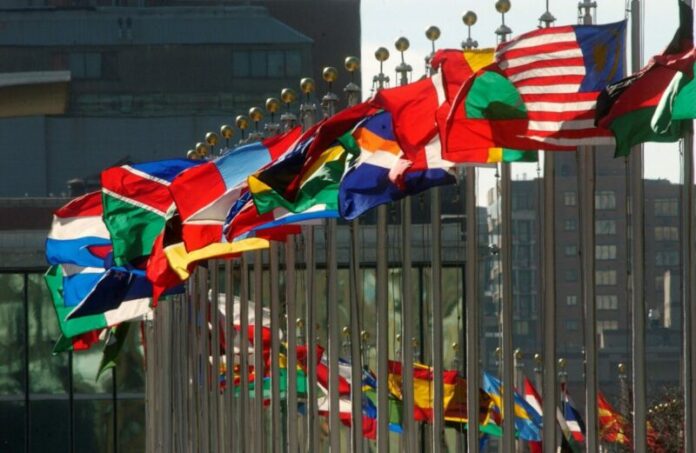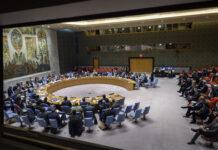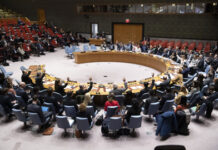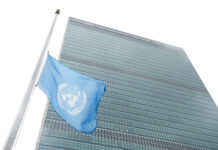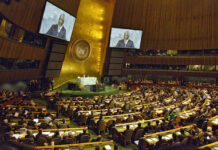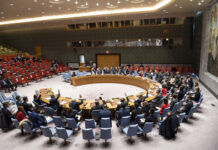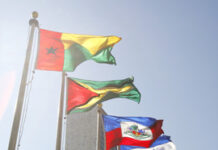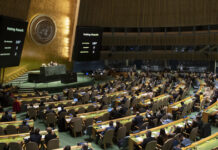This is the News in Brief from the United Nations
World court issues appeal calling for prevention of genocidal acts in Gaza
The International Court of Justice (ICJ) has declared that Palestinians have a right to be protected from genocide and called on Israel to “take all measures within its power” to prevent this from happening.
Judges at the UN’s top court – which is based in The Hague – also stressed the need to allow the entry of desperately needed humanitarian aid into the war-shattered enclave.
ICJ President Joan Donoghue also called for the release of all remaining hostages taken during the Hamas-led attacks on Israeli communities in which some 1,200 people were massacred on 7 October.
But there was no explicit call for an immediate halt to Israel’s full-scale military operation in the Strip which is believed to have left more than 26,000 dead, according to Gaza health authorities.
Gaza: UN rights office condemns ‘chaotic’ Israeli mass evacuation orders
The development came as the UN human rights office, OHCHR, warned that mass evacuation orders issued by the Israeli military were pushing people “into ever smaller areas” in Gaza, amid “ever-intensifying violence”.
The warning came nearly four months into the war which has seen widespread Israeli bombardment of the Gaza Strip.
Ajith Sunghay, Head of the UN Human Rights Office for the Occupied Palestinian Territory, said that shelling had continued in areas designated as “safe” by the Israeli military, including Al Mawasi in western Khan Younis.
“Even after the explosions were reported in Al Mawasi on 22 and 23 January, the IDF continued to order residents of western Khan Younis to move there. That order which was reissued repeatedly on 23, 24 and 25 January reportedly impacted more than half a million people as well as three hospitals which have been under heavy attacks and siege.”
Since war erupted in Gaza there have been 318 attacks on healthcare in the enclave causing 615 fatalities and 778 injuries, according to the UN World Health Organization (WHO).
The violence has impacted 95 healthcare facilities and only 14 hospitals out of 36 still function – seven in the south and seven in the north.
Türk condemns nitrogen gas execution, urges death penalty abolition
UN rights chief Volker Türk has expressed deep regret over the killing of a death row inmate by nitrogen gas suffocation in the US state of Alabama – a world first.
The High Commissioner for Human Rights cited concerns on Friday that the untested method may constitute torture or cruel, inhuman or degrading treatment.
Spokesperson for the UN rights office, Ravina Shamdasani, told journalists in Geneva that Kenneth Smith reportedly took 22 minutes to die, after a mask was fitted to his head and nitrogen gas was pumped in.
“In spite of our plea the execution as you know went ahead. We deeply regret the execution of Kenneth Eugene Smith in Alabama despite serious concerns that this novel and untested method of suffocation by nitrogen gas may amount to torture or cruel, inhuman or degrading treatment.”
Ms. Shamdasani called the called the death penalty “an anachronism that doesn’t belong in the 21st century” and expressed concern that the use of nitrogen for execution might set a precedent for use elsewhere.
Sudan: Dire plight of more than 10 million displaced by conflict
At least 10.7 million people have been uprooted by conflict in Sudan and most of them need help within the war-torn country, the UN migration agency IOM said on Friday.
In a call to scale up the aid response to the world’s largest displacement crisis, the International Organization for Migration (IOM) said that needs were “overwhelming”, with “dire shortages of food, shelter, healthcare and sanitation”.
Armed clashes between Sudan’s two main rival militaries that began last April are responsible for displacing at least six million people inside the country, on top of the three million who were already on the move, according to IOM.
The UN agency noted that the ongoing conflict continues to have a devastating impact on ordinary people, because critical infrastructure has been destroyed, including healthcare, schools, roads and utilities.
IOM has reached nearly 1.2 million people in Sudan and neighbouring countries with lifesaving aid; a total of $168 million is needed this year for the agency’s Crisis Response Plan.
Daniel Johnson, UN News.
Source of original article: United Nations (news.un.org). Photo credit: UN. The content of this article does not necessarily reflect the views or opinion of Global Diaspora News (www.globaldiasporanews.com).
To submit your press release: (https://www.globaldiasporanews.com/pr).
To advertise on Global Diaspora News: (www.globaldiasporanews.com/ads).
Sign up to Global Diaspora News newsletter (https://www.globaldiasporanews.com/newsletter/) to start receiving updates and opportunities directly in your email inbox for free.


